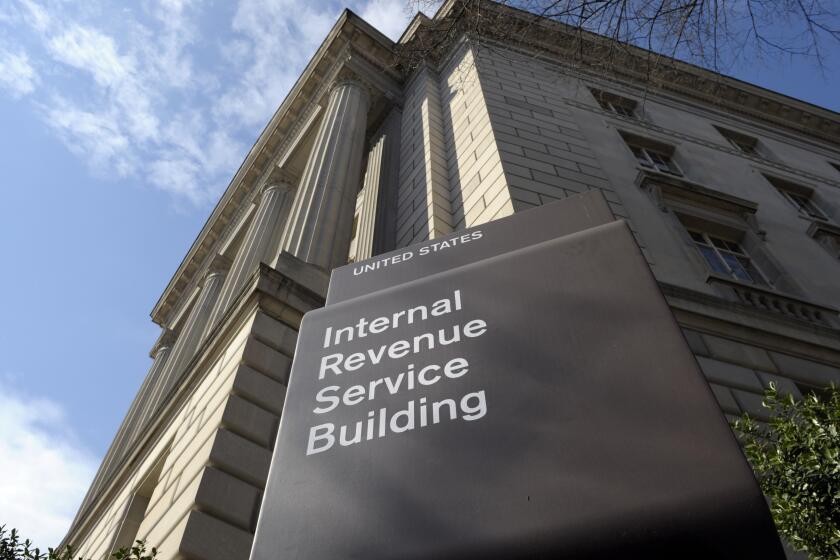The IRS wants to give California taxpayers $94 million in refunds — if they file returns

- Share via
As hard as it may be to imagine, Californians have left millions of dollars in unclaimed tax refunds with the Internal Revenue Service. And if they don’t act soon, that money will go to the federal treasury.
The money was left behind by taxpayers who didn’t file tax returns, mainly because they earned so little in their jobs that they weren’t required to fill out a 1040 form. They’re eligible to receive the taxes withheld from their paychecks, but that money won’t come to them automatically — they have to file a return to recover it.
Every year, IRS officials say, about $1 billion to $1.5 billion in refunds goes unclaimed, compared with about $300 billion in refunds paid. The feds give you more than three years to collect an unclaimed refund, but for taxes paid in 2020, time is running out.
According to the IRS, an estimated 88,200 Californians who did not file returns in 2020 are owed $94.2 million, which works out to $835 per filer on average.
The new online system, aimed at low- and moderate-income taxpayers, offers more help than the IRS’ Free File program. It’s only in California and 11 other states.
Although the average amount they stand to recover is less than $1,000, there’s more at stake for many taxpayers with unclaimed money. That’s because their refund could be boosted by the Earned Income Tax Credit — an add-on for low-income workers that could amount to several hundred dollars for a single person or thousands of dollars for a family with children.
Under federal law, taxpayers have to file their annual returns by mid-April, barring a natural disaster, unless their incomes are less than a minimum threshold. If they don’t file a return, they have three years after the filing deadline to file a belated return and claim any money they were owed.
The income threshold in 2020 for most people less than 65 years old was $12,400 to $24,800, depending on the size of the household; for seniors, the thresholds were at least $1,650 higher. The exception is people who were claimed as dependents by other taxpayers; their thresholds are lower if they collected more than a certain amount in dividends, interest or capital gains.
Because of the COVID-19 pandemic, the tax-filing deadline for 2020 was May 17, 2021. That means anyone who did not file a return for 2020 has until May 17, 2024, to do so and claim the amount they’re owed. Otherwise, the federal government keeps it.
If you paid taxes in 2021 or 2022 but didn’t file a return, the deadline for claiming a refund won’t be for another year or two. But there’s no reason to wait; you can file those returns now and get your money back sooner.
The IRS is again giving taxpayers in disaster-stricken San Diego County more time to file their returns and pay what they owe this year.
Free tax preparation and filing services
For many non-filers, the IRS offers three free options. Direct File offers step-by-step guidance for people whose returns require only the most basic federal forms — for example, people whose income was limited to wages recorded on a W-2 and Social Security benefits — but the IRS says the service will be available only until April 15.
The Free File Guided Tax Software option connects you to one of a selection of third-party online tax-preparation services, which will prepare and file your return for free if you meet the income limit (which is well above the minimum threshold for filing a return). And the Free File Fillable Forms alternative is for people who want to fill out their tax forms themselves.
For the record:
2:45 p.m. April 4, 2024An earlier version of this story reported that the United Way’s free tax preparation and filing services were available only to people who’d created an account at MyFreeTaxes.org by April 1. The deadline applies just to the online service that uses certified volunteers to guide taxpayers.
The United Way of California is one of several community-based organizations offering free tax preparation and filing services. One of its services — filing online with the help of an IRS-certified volunteer — is available only to lower-income people who’d created an account on the MyFreeTaxes.org site by April 1. That deadline does not apply to its free online do-it-yourself tax-filing service or the in-person help offered to lower-income taxpayers, the United Way said.
In addition, the AARP Foundation Tax-Aide and the IRS-sponsored Volunteer Income Tax Assistance program can connect you to a volunteer tax preparer who will do your tax return for you or help you do it yourself, at no charge to you. These services provide tax preparation or guidance only to low- and moderate-income taxpayers who meet the income limits, or who have disabilities or limited English proficiency.
Intuit’s TurboTax and H&R Block also make free versions of their tax preparation and filing software available online. There’s no income limit, but like Direct File from the IRS, the services work only with basic returns that demand little more than a 1040 form. That would exclude anyone with income or losses from a small business, for example, or whose investments pay more than $1,500 in dividends.
More to Read
Inside the business of entertainment
The Wide Shot brings you news, analysis and insights on everything from streaming wars to production — and what it all means for the future.
You may occasionally receive promotional content from the Los Angeles Times.













